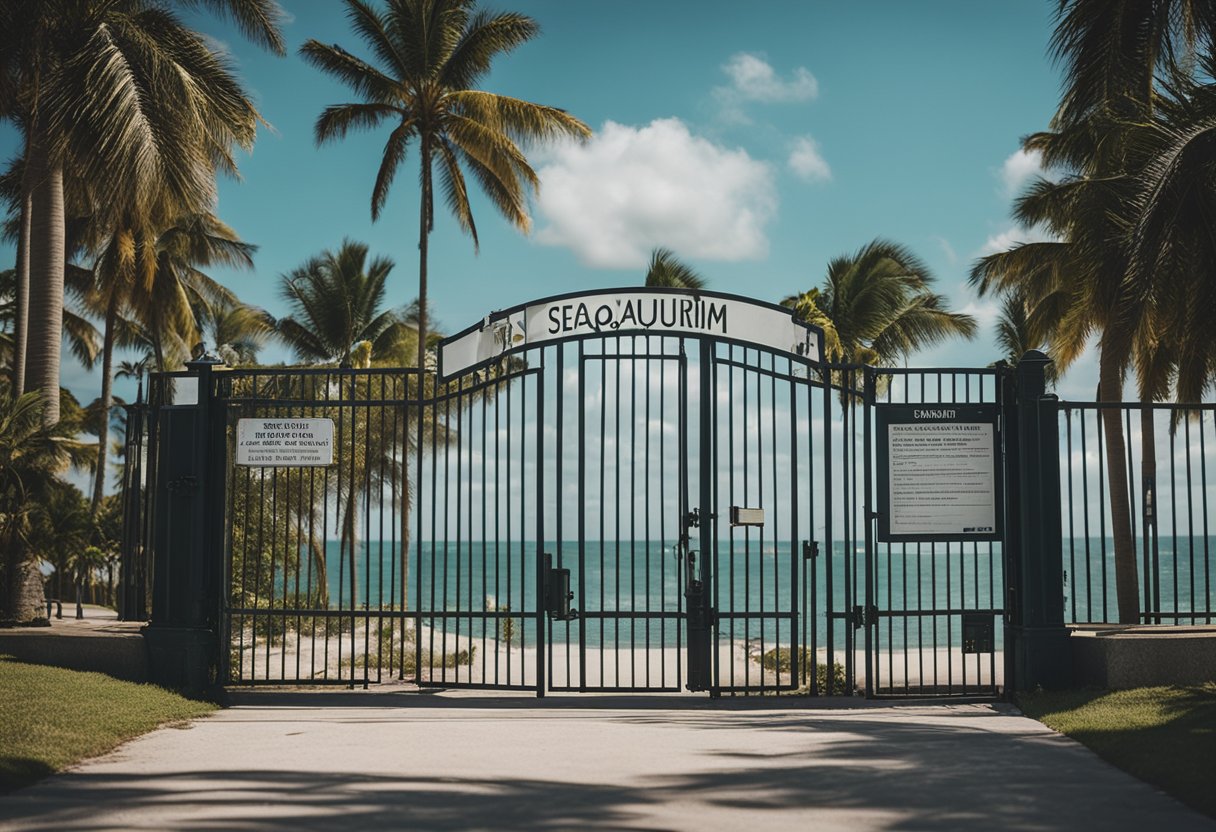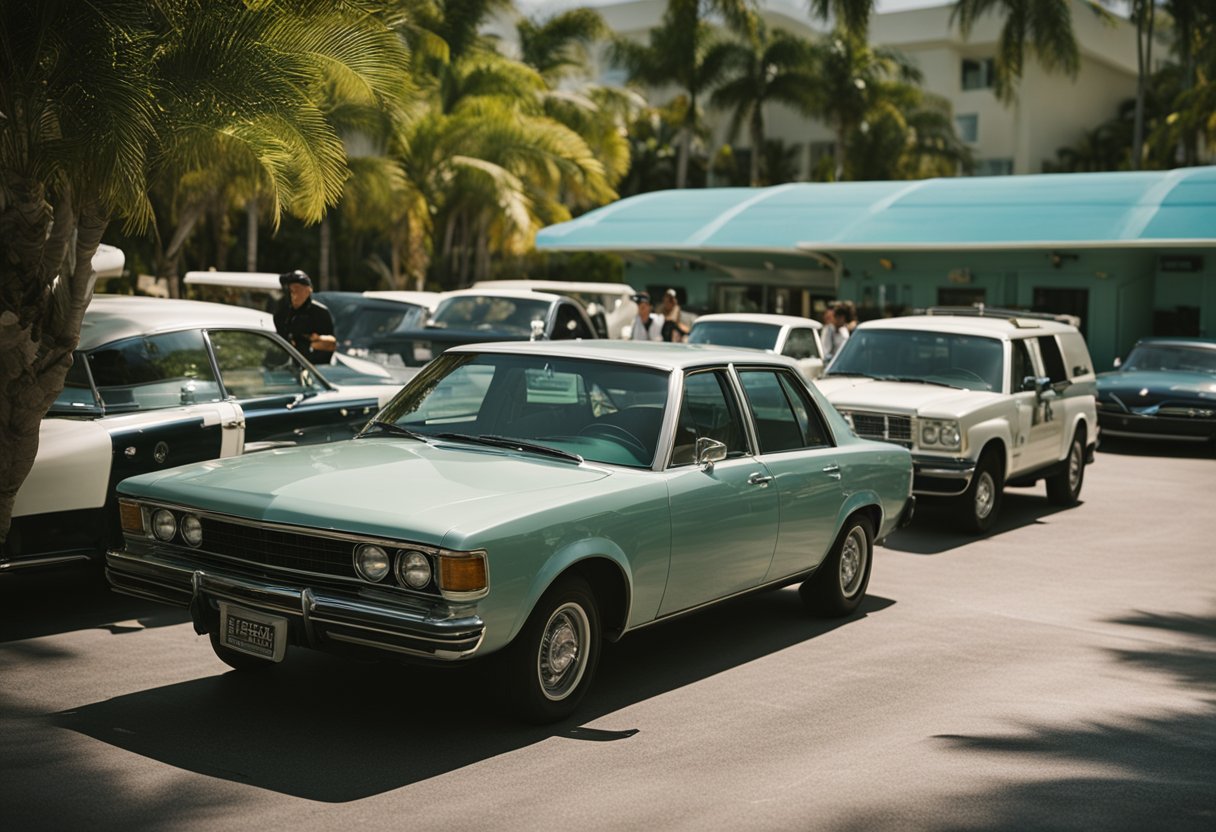The Miami Seaquarium, a popular tourist destination in Florida, has recently received an eviction notice from Miami-Dade County. The marine park has been a source of controversy and scrutiny in recent years, with concerns over animal welfare and unpaid rent. The eviction notice comes several months after the death of Lolita, an Orca that had been living at the park for over 50 years.

According to reports, Miami-Dade County has ordered the operators of the Miami Seaquarium to vacate the property by next month. The county cited unpaid rent, alleged lease violations, and poor animal care as reasons for the eviction. The Miami Seaquarium has been leasing the government-owned site for several decades, but the recent controversies have led to a termination of the lease agreement.
The Miami Seaquarium has responded to the eviction notice, alleging that the county is unfairly targeting the park. The marine park has stated that it has been making efforts to improve animal welfare and address concerns raised by animal rights activists. However, the eviction notice has sparked a debate over the future of the Miami Seaquarium and the role of marine parks in modern society.
Eviction Notice Details

Miami Seaquarium, a popular tourist attraction located in Miami, has received an eviction notice from Miami-Dade County. The notice was issued due to alleged lease violations, unpaid rent, and poor conditions for the animals. The Seaquarium has been operating under a lease with the county for the government-owned waterfront property.
The eviction notice was served on Thursday, March 7, 2024, and the Seaquarium has until April 21 to vacate the property or face possible eviction. The notice was issued after months of controversy and complaints from animal rights activists over the treatment of animals at the park, particularly Lolita, the beloved Orca that died last year.
According to the search results, the Seaquarium has responded to the eviction notice, alleging that the county has not provided adequate support for the park and that the allegations of lease violations and poor conditions for the animals are unfounded. However, the county has stated that the Seaquarium has failed to comply with numerous requests to address the issues, and that the eviction notice is necessary to protect the welfare of the animals and ensure that the property is being used appropriately.
The Seaquarium, which has been operating for decades, has been a popular attraction for tourists and locals alike. However, the recent controversy and legal issues have put the future of the park in question. It remains to be seen what will happen to the Seaquarium in the coming months, and whether it will be able to continue operating in its current location.
Historical Overview of Miami Seaquarium

Miami Seaquarium is an aquatic park located on the island of Virginia Key in Biscayne Bay, Miami, Florida. The park was opened in 1955 and has since been one of the most popular tourist attractions in the city. The park is home to various marine animals, including dolphins, sea lions, manatees, and several species of fish.
Over the years, the Miami Seaquarium has been the site of various protests, lawsuits, and inspection violations. The park has been criticized by animal rights activists for keeping marine animals in captivity and for its treatment of animals. The park has also been the site of several high-profile animal deaths, which have led to increased scrutiny of the park’s operations.
In 2023, a federal inspection report alleged poor care of animals at the park, which led to Miami-Dade County giving the park weeks to vacate its government-owned campus. The park was also cited for a “long and troubling history of violations” in the lease termination notice. The park was ordered to close by next month following several high-profile animal deaths and a series of scathing federal inspection reports.
The Miami Seaquarium has been a controversial attraction for many years, with animal rights activists calling for its closure. The eviction notice is the latest development in a long and troubled history for the park, which has faced criticism and legal challenges from animal rights groups and others over the years.
Reasons for Eviction
Miami Seaquarium has been served an eviction notice by Miami-Dade County, citing a “long and troubling history of violations” in a lease termination notice sent to the chief executive officer of The Dolphin Company, which owns the Seaquarium. The company has been ordered to vacate the property by April 21, 2024, according to the letter from the mayor’s office.
The reasons for the eviction notice include a “long and troubling history of violations,” including failing to provide for the safe and adequate care of animals, failing to maintain the property in a safe and sanitary condition, and failing to comply with county regulations. The Seaquarium has received a series of notices of violations of the lease from the county in recent years, according to NPR.
The Miami Seaquarium has been under scrutiny for years due to its treatment of animals, particularly its captive orca Lolita. The park has faced protests and petitions from animal rights activists who have called for the release of Lolita to a sea pen or sanctuary. The park has also faced criticism for its treatment of other animals, including dolphins and sea lions.
The eviction notice comes after the death of a bottlenose dolphin at the Seaquarium in January 2024, which raised concerns about the park’s animal welfare practices. The park has also been facing financial difficulties due to declining attendance and revenue, according to Axios.
Miami Seaquarium has stated that it plans to fight the eviction notice and will continue to operate until a final decision is made. The park has been a popular tourist attraction in Miami for over 60 years, and its closure would have a significant impact on the local economy.
Legal Proceedings
Miami-Dade County has issued an eviction notice to the Miami Seaquarium, a popular tourist attraction located on Virginia Key, due to alleged improper care of the grounds and animals. The marine park’s parent company, Dolphin Company, has until Monday to respond to the notice, and the Seaquarium has vowed to fight back against the termination of their lease.
The legal battle between Miami-Dade County and the Miami Seaquarium has been ongoing for some time. In August of 2023, the tourist attraction faced criticism after the death of Lolita the orca. The county accused the operators of the Seaquarium of improperly caring for the animals, and the situation has escalated to the point of eviction.
Miami-Dade County Mayor Daniella Levine Cava cited a “long and troubled history” between the county and the Seaquarium as the reason for the eviction notice. The Seaquarium has until April 21 to vacate its government-owned site or face possible eviction.
The Miami Seaquarium has responded to the eviction notice with a letter alleging that the county is attempting to terminate their lease early without just cause. The Seaquarium has stated that they have invested significant resources in the park and have always complied with the terms of their lease. The legal battle between the county and the Seaquarium is likely to continue for some time, as both sides are determined to protect their interests.
Stakeholder Reactions
The eviction notice served to the Miami Seaquarium has garnered mixed reactions from various stakeholders. While some view it as a necessary step towards ensuring animal welfare, others have expressed concern about the impact on the local economy and tourism industry.
Animal rights activists have long criticized the Miami Seaquarium for its treatment of marine animals, particularly its captive dolphins. The recent federal report documenting continuous violations and poor quality of animal care further strengthened their case. As such, they have welcomed the eviction notice as a positive development towards ending the exploitation of marine life for entertainment purposes.
On the other hand, local business owners and tourism officials have expressed concern about the potential negative impact on the local economy. The Miami Seaquarium has been a major tourist attraction since its opening in 1955, and its closure could lead to a significant loss of revenue for the area. Additionally, the termination of the lease could also result in job losses for the park’s employees.
Miami-Dade County officials have stated that they are committed to working with the Miami Seaquarium to ensure a smooth transition and minimize any negative impact on the local economy. However, they have also emphasized the importance of prioritizing animal welfare and ensuring that all businesses operating on county-owned land adhere to the highest standards of care.
Overall, the eviction notice served to the Miami Seaquarium has sparked a range of reactions from various stakeholders. While some see it as a positive step towards ending the exploitation of marine animals, others are concerned about the potential negative impact on the local economy.
Impact on Local Economy
The Miami Seaquarium is a major tourist attraction in Miami, Florida, and its eviction could have a significant impact on the local economy. The Seaquarium is one of the oldest and most well-known marine parks in the country, attracting millions of visitors each year and generating millions of dollars in revenue for the city.
The park is home to a variety of marine animals, including dolphins, sea lions, and killer whales. It also offers various shows and exhibits that are popular among tourists. With the eviction notice, the park’s future is uncertain, and it could mean the loss of jobs for hundreds of employees.
The Miami Seaquarium is located on prime waterfront property, which is highly valuable in Miami. If the park is forced to close, it could open up opportunities for new development in the area. However, this could also mean the loss of a beloved landmark for many locals and tourists.
It remains to be seen what the outcome of this eviction notice will be and how it will affect the local economy in the long run. In the meantime, the Miami Seaquarium continues to operate as usual and is fighting back against the eviction notice.
Animal Welfare Considerations
The Miami Seaquarium has been under scrutiny for years due to concerns over animal welfare. The facility is known for its performances featuring dolphins, sea lions, and killer whales. However, animal rights activists have long criticized the park for keeping marine mammals in captivity and forcing them to perform.
The death of Lolita, a killer whale also known as Tokitae, in August 2024 has brought renewed attention to the issue. Lolita had spent most of her life in a tank at the Miami Seaquarium, which measures 80 feet by 35 feet and is 20 feet deep. Animal rights activists had been campaigning for years to have her released into the wild, arguing that her tank was too small and that she was suffering from health problems as a result of her captivity.
The Miami-Dade County has cited animal welfare concerns and a host of other issues with the park in its decision to evict the company that owns the Miami Seaquarium. The county has given formal notice to the park’s operators to vacate the property by April 21, 2024. The move follows several federal inspections that found numerous violations of animal welfare regulations.
The Miami Seaquarium has defended its practices, arguing that its animals are well-cared for and that it plays an important role in educating the public about marine life. However, the controversy surrounding the park has led to a decline in attendance in recent years. The eviction notice is likely to be welcomed by animal rights activists, who have long argued that the park is cruel and outdated.
Future of the Miami Seaquarium
The future of Miami Seaquarium remains uncertain after the park received an eviction notice from Miami-Dade County. The park has until April 21, 2024, to vacate the property.
The Miami Seaquarium has been a popular tourist attraction since it opened in 1955. However, in recent years, the park has faced criticism for its treatment of marine animals, particularly after the death of Lolita the orca in August.
Miami-Dade County cited a “long and troubling history of violations” in the lease termination notice sent to the chief executive officer of The Dolphin Company, which owns the Seaquarium. The company was told to vacate the property by April 21, according to the letter from the mayor’s office.
The park can challenge the eviction in court, but it remains to be seen whether they will do so. If they do not, the future of the park is uncertain. It is possible that another company could take over the property and continue to operate the park, but it is also possible that the property could be repurposed for another use.
Regardless of what happens, it is clear that the Miami Seaquarium will need to make significant changes if it is to continue operating. The park has faced criticism from animal rights activists for years, and the recent eviction notice is just the latest in a long line of setbacks for the park.
- Husband of Actress Devon Aoki Arrested in Coral Gables Hit-and-Run - December 17, 2025
- “Operation El Primo” Dismantles Major Cocaine Ring in Miami - December 17, 2025
- Mother Seeks Justice After Son Killed During Alleged Home Invasion in Miami-Dade - December 16, 2025




